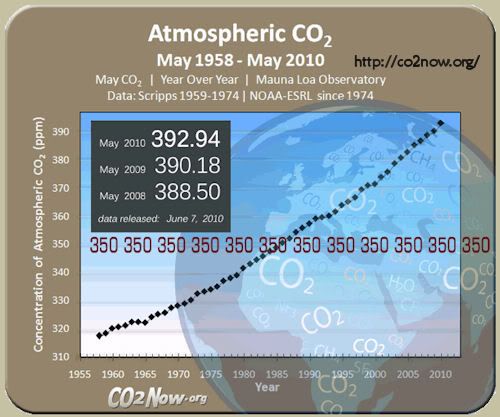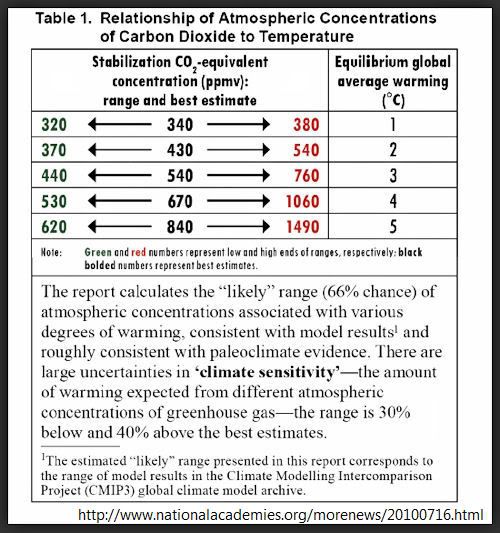(10:30AM EST – promoted by Nightprowlkitty)
ClimateGate Advocates — just got their work cut out for them …
Emissions, Concentrations, and Impacts Over Decades to Millennia
July 16, 2010
Choices made now about carbon dioxide emissions reductions will affect climate change impacts experienced not just over the next few decades but also in coming centuries and millennia, says a new report from the National Research Council. Because CO2 in the atmosphere is long lived, it can effectively lock the Earth and future generations into a range of impacts, some of which could become very severe.
Who is the National Academies?
ABOUT:
The National Academies perform an unparalleled public service by bringing together committees of experts in all areas of scientific and technological endeavor. These experts serve pro bono to address critical national issues and give advice to the federal government and the public.
Four organizations comprise the Academies: the National Academy of Sciences, the National Academy of Engineering, the Institute of Medicine and the National Research Council.
The National Academies (think “Mothership” for the National Academy of Sciences and others) is strongly suggesting that CO2 levels, is “too abstract” of a measure, to get Traction among Policy Makers.
Charts like these:

larger image
May 2010 … 393 ppm … and CO2 is Accelerating by jamess — Jun 25, 2010
Charts like these DO NOT communicate the REAL WORLD Impacts that will be associated with them.
These respected Scientists are quietly suggesting that a more “common sense” Metric, be used instead of CO2 PPMs, when discussing the Urgent problem of Climate Change, facing the world, and all of Humanity.
That New Metric:
Global Mean Temperature Change
[Note: “Mean” is just a fancy word for Average]
Here is my quick analysis, for some of the more important points of their Findings … and my Executive summary, of the Executive summary if you will …
[Note: ALL edits and emphasis made here, are those of the Diarist, and not the National Academies and their members. Please consult the links provided to read this important National Academies Report in its entirety.]
Climate Stabilization Targets: Emissions, Concentrations, and Impacts over Decades to Millennia Executive Summary (pdf)
[Intro Statement]
Emissions of carbon dioxide from the burning of fossil fuels have ushered in a new epoch where human activities will largely determine the evolution of Earth’s climate. Because carbon dioxide in the atmosphere is long lived, it can effectively lock the Earth and future generations into a range of impacts, some of which could become very severe.
Therefore, emissions reductions choices made today matter in determining impacts experienced not just over the next few decades, but in the coming centuries and millennia. Policy choices can be informed by recent advances in climate science that quantify the relationships between increases in carbon dioxide and global warming, related climate changes, and resulting impacts, such as changes in streamflow, wildfires, crop productivity, extreme hot summers, and sea level rise.
[…]The report concludes that the world is entering a new geologic epoch, sometimes called the Anthropocene, in which human activities will largely control the evolution of Earth’s environment. Carbon emissions during this century will essentially determine the magnitude of eventual impacts and whether the Anthropocene is a short-term, relatively minor change from the current climate OR an extreme deviation that lasts thousands of years.
Humans activities matter. So DO our Decisions. The time to act is Now.
[Continuing from Executive Summary Link …]
Impacts Can be Linked to Global Mean Temperatures
To date, climate stabilization goals have been most often discussed in terms of stabilizing atmospheric concentrations of carbon dioxide (e.g., 350 ppmv, 450 ppmv, etc.). This report concludes that, for a variety of conceptual and practical reasons, it is more effective to assess climate stabilization goals by using global mean temperature change as the primary metric.

larger image
pdf of the National Academies Chart
If you are metrically-challenged, like me, here are the Fahrenheit equivalents, for their new Climate Change yardstick:
1 C = 1.8 F
2 C = 3.6 F
3 C = 5.4 F
4 C = 7.2 F
5 C = 9.0 F
[Continuing from Executive Summary Link …]
There is now increased confidence in how global warming levels of 1°C, 2°C, 3°C etc
[…][Diarist Note: for each ONE degree (1°C) (or 1.8°F) of average global temperature rise, expect these LOCAL Ecological ‘linkages’:]
— 5-10% changes in precipitation in a number of regions
— 3-10% increases in heavy rainfall
— 5-15% yield reductions of a number of crops
— 5-10% changes in streamflow in many river basins worldwide
— About 15% and 25% decreases in the extent of annually averaged and September Arctic sea ice, respectively
[…]
[Here is the obligatory Bullet List of Impacts, for those who need such Warnings Signals, to take notice …]
SOME CLIMATE CHANGES AND IMPACTS OF NEXT FEW DECADES AND CENTURIES
FOR 1-2°C WARMING [1.8 to 3.6°F]
FIRE
— 200-400% increase in area burned
per degree in parts of western USFOR 1-4°C WARMING [1.8 to 7.2°F]
RAIN
— 5-10% less rainfall per degree in Mediterranean, SW North America, southern Africa dry seasons
— 5-10% more rainfall per degree in Alaska and other high latitude NH areas
— 3-10% more heavy rain per degree in most land areasRIVERS
— 5-10% less streamflow per degree in some river basins, including the Arkansas and Rio GrandeFOOD
— 5-15% reduced yield of US corn, African corn, and Indian wheat per degreeSEA ICE
— 15% and 25% reductions in Arctic sea ice area per degree, in the annual average and September (respectively)FOR 3°C [5.4°F]
COASTS
— Loss of about 250,000 square km of wetlands and drylands
— Many millions more people at risk of coastal floodingEXTREMES
— About 9 out of 10 summer seasons expected to be warmer than all but 1 summer out of 20 in the last decades of the 20th century over nearly all land areasFOR 4°C [7.2°F]
EXTREMES
— About 9 out of10 summers warmer than the warmest ever experienced during the last decades of the 20th century over nearly all land areasFOR 5°C [ 9.0°F]
FOOD
— Yield losses in most regions and potential doubling of global grain prices
Sounds Serious.
What is to be done about it?
For one, PICK A CO2 REDUCTION TARGET LEVEL,
and then pour resources into reaching those Targets.
[Continuing from Executive Summary Link …]
Stabilization Requires Deep Emissions
ReductionsThe report demonstrates that stabilizing atmospheric carbon dioxide concentrations will require deep reductions in the amount of carbon dioxide emitted. Because human carbon dioxide emissions exceed removal rates through natural carbon “sinks,” keeping emission rates the same will not lead to stabilization of carbon dioxide.
Emissions reductions larger than about 80%, relative to whatever peak global emissions rate may be reached, are required to approximately stabilize carbon dioxide concentrations for a century or so at any chosen target level.
[…]
In the example given above, choosing a concentration target of 550 ppmv could produce a likely global warming at equilibrium as low as 2.1°C, but warming could be as high as 4.3°C, increasing the severity of impacts. Thus, choices about stabilization targets will depend upon value judgments regarding the degree of acceptable risk.Conclusion
This report provides a scientific evaluation of the implications of various climate stabilization targets. The report concludes that certain levels of warming associated with carbon dioxide emissions could lock the Earth and many future generations of humans into very large impacts; similarly, some targets could avoid such changes. It makes clear the importance of 21st century choices regarding long-term climate stabilization.
This is News. Independent, Peer-reviewed, Scientific News.
Our CO2 Choices Now — WILL Impact many Future Generations.
This IS the Waterloo for ClimateGate Advocates.
ClimateGate Advocate: There must be a ‘Hidden Agenda’ here … these Scientists Must work for Al Gore or something?
What is the National Academies Agenda? [from the Executive Summary link]
The National Academies appointed the above committee of experts to address the specific task requested by the Energy Foundation and the U.S. Environmental Protection Agency. The members volunteered their time for this activity; their report is peer-reviewed and the final product signed off by both the committee members and the National Academies. This brief was prepared by the National Research Council based on the report.
For more information, contact the Board on Atmospheric Sciences and Climate at (202) 334-2744 or visit http://dels.nas.edu/basc.
Well maybe that Climate Board has an ulterior motive?
BASC
The Board on Atmospheric Sciences and Climate (BASC) provides independent assistance to federal agencies and the nation on issues in the atmospheric and climate sciences. BASC strives to advance understanding of atmospheric science, meteorology, and climate; foster application of this knowledge to benefit the public; help ensure that US research programs are responsive to scientific opportunities and the needs of the nation; and help make scientific information more useful in government planning and decision-making.
ClimateGater: Maybe that Board on Atmospheric Sciences and Climate, is really a sub-group of ACORN, or the New Black Panthers Party? … There must be a connection to that Govt Socialism Agenda, somewhere. I want my SUV!
No. Science has the Agenda of Discovery. Fact Finding. Proactive actions. Better Decision making. Taking over control of your wallets, not so much.
BASC serves as a U.S. scientific interface to the planning and conduct of many international research programs. BASC does not conduct research, but works to give research a broader impact on society, both in the United States and internationally. BASC’s objectives are:
— Provide a national and international forum for discussion of the atmospheric, weather, and climate sciences, focusing on research needs, policy issues, educational implications, and the resources required to improve understanding of the atmosphere and its interaction with human societies and other components of the Earth system.
— Respond to requests for assistance from government agencies, Congress, and others in the science community, such as by establishing ad hoc study committees, organizing and facilitating workshops and conferences, and designing other mechanisms to advance science, research, technology development, and resource-related issues.
— Plan and initiate investigations of key and emerging issues identified by the Board’s members, as considered appropriate by the Board’s parent Division on Earth and Life Studies and the Governing Board of The National Academies.
— Disseminate the results of its studies and provide a mechanism for the exchange of information on all aspects of atmospheric, weather, and climate science and research.
— Foster communication among members of the atmospheric and climate science community in the United States, encourage increased international cooperation, and provide advice from the atmospheric sciences community to federal agencies and other relevant decision-makers.
— Coordinate atmospheric science expertise as needed for projects conducted by or with other NRC units, international project offices, and other organizations with relevant atmospheric sciences, weather, and climate activities.
Drats! Curses, foiled again. These guys are just a bunch of Science Promotion Geeks. Where are the Creationists on that Panel?

National Academy of Sciences — The National Academies:
Advisers to the Nation on Science, Engineering, and Medicine
Isn’t it about time, SOMEONE [in the US Congress] actually Took their Advice?
Isn’t it the Pursuit of Science, that has given us ‘the Progress‘ we enjoy so far, as a Civilized Society?
WHY in the World, should we STOP listening to Scientists now? Do we think for one minute that the following the Quarterly Goals of Corporations and Wall Street Bankers will put us on the Ecologically-sound path, we need to be on?
HELL NO!
In my opinion, Listening to Scientists, and acting on their Scientific Advice is our only hope, of putting the planet on the path of a “Stabilization Target”, a livable Temperature range. Setting such a course now, is the Only way for us to reach that Global Climate Target, where OUR CO2 Impacts turns out to be a “relatively minor change” — around 2 C.
Just.A.blip … IF WE ACT … NOW (… that’s a BIG IF)
And finding such a collective COMMON Ecologically-sound path, is our best hope for survival, as an Intelligent Species of this new Anthropocene Era.
The world is entering a new geologic epoch, sometimes called the Anthropocene, in which human activities will largely control the evolution of Earth’s environment.
Please see my previous posts on that new geologic epoch of Human Impacts.
And on one possible path for averting the worst of these Anthro-Impact scenarios.
Fortunately for us, Science sometimes provides Opportunities, as well as Warnings. The Question is, are we as a Species, wise enough to make the most of them?
As always, Thank you, for taking the time, out of your day to read this.

5 comments
Skip to comment form
Author
who was it that said that?
Kurt Vonnegut?
We could use some Time Jumping storylines about now,
don’t you think?
It is passing strange that our politicians run around talking in terms of “intergenerational theft” about something as ephemeral and trivial as the tax code – see John McCain for one – and yet are silent on far more grave matters that foreclose options on people who will not be born for hundreds of years.
It is murdering the future itself.
But I’ve read a bunch of the primary source research documents on abrupt climate change.
393 ppm? pretty scary stuff.